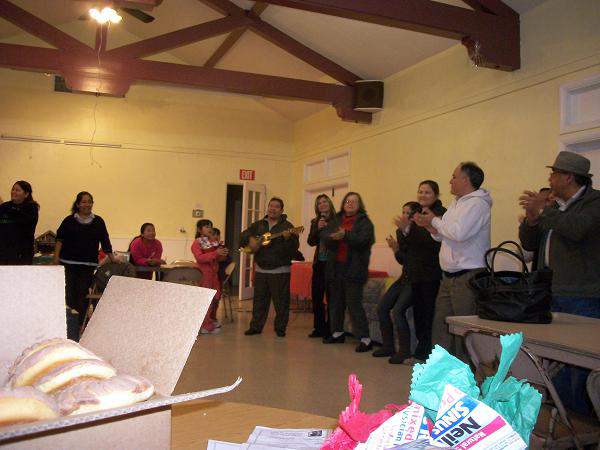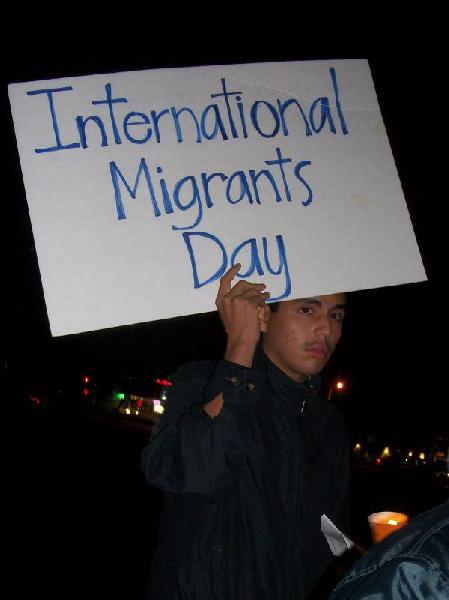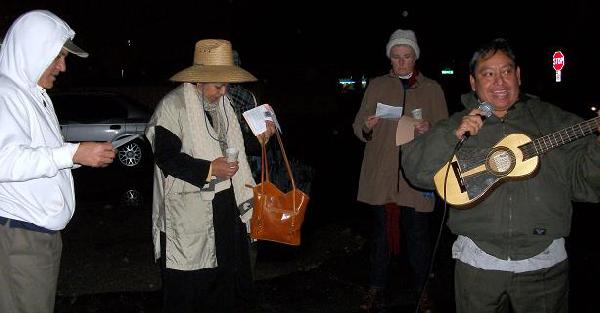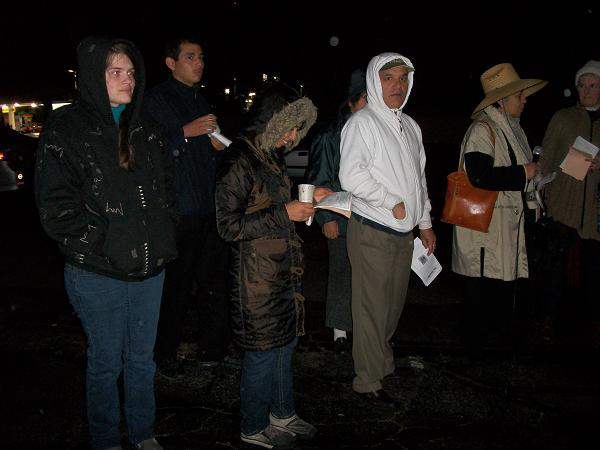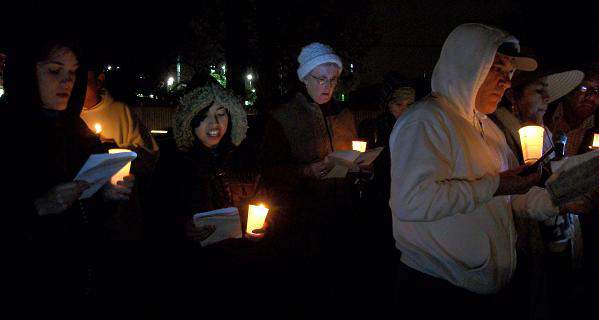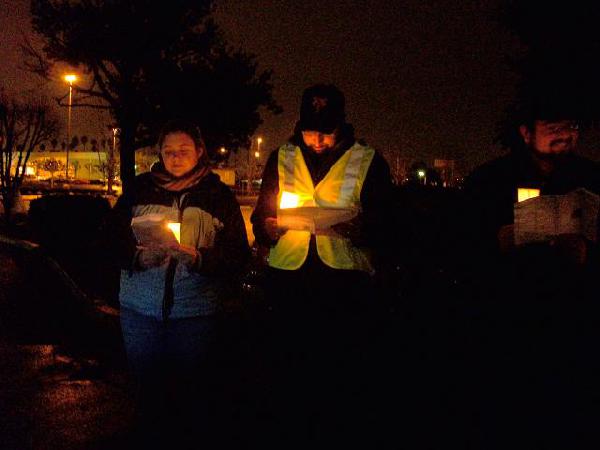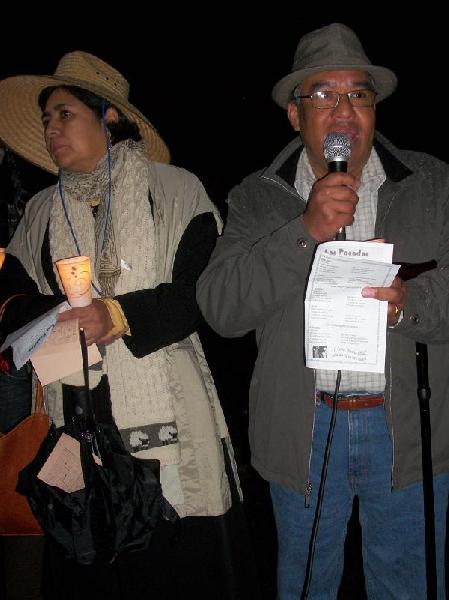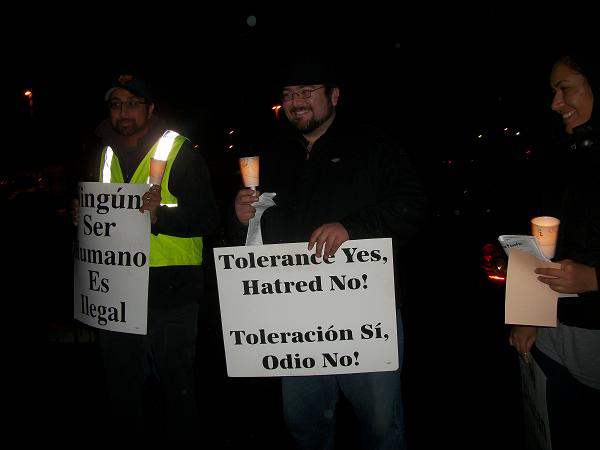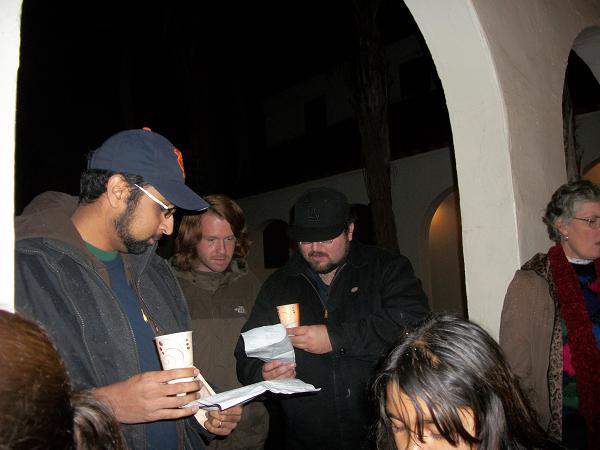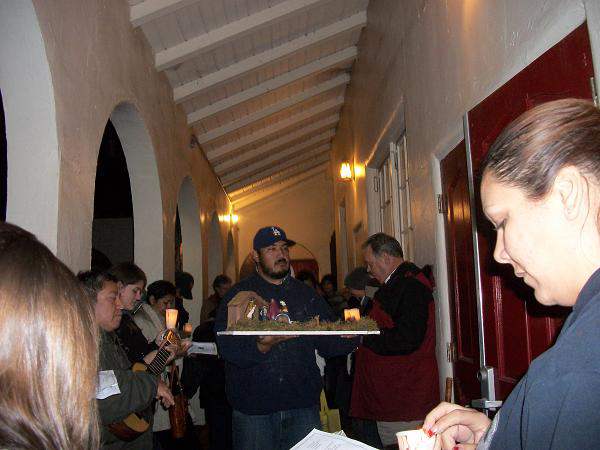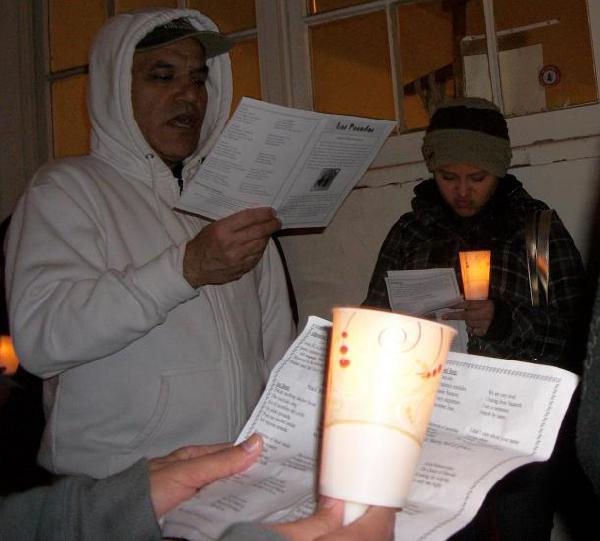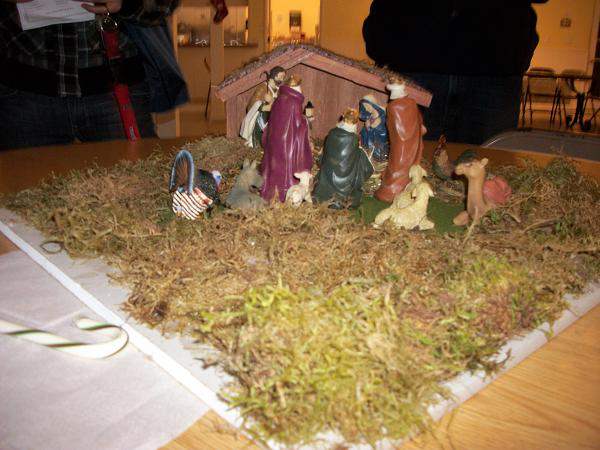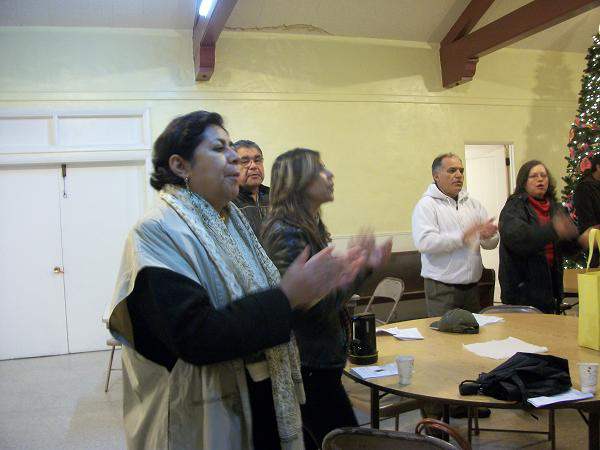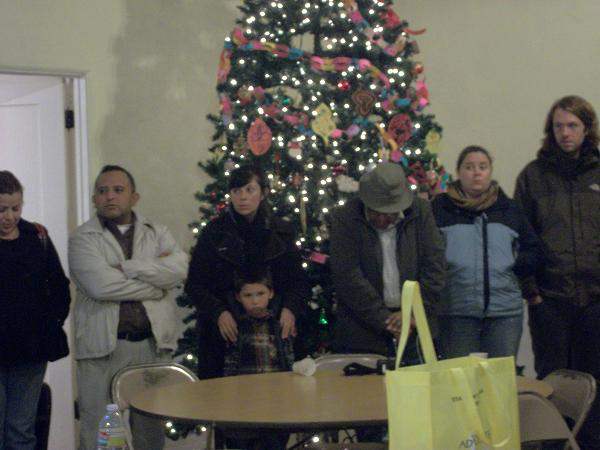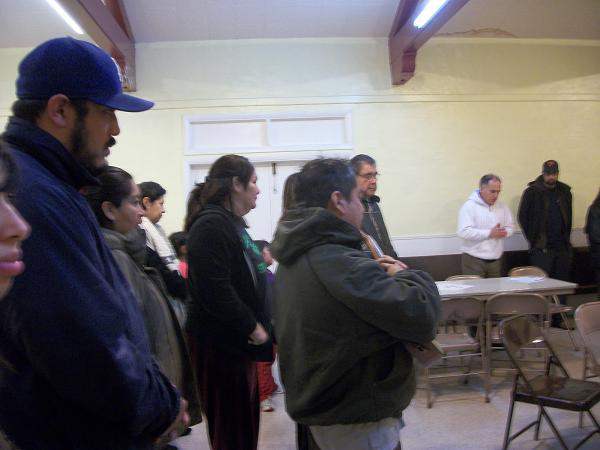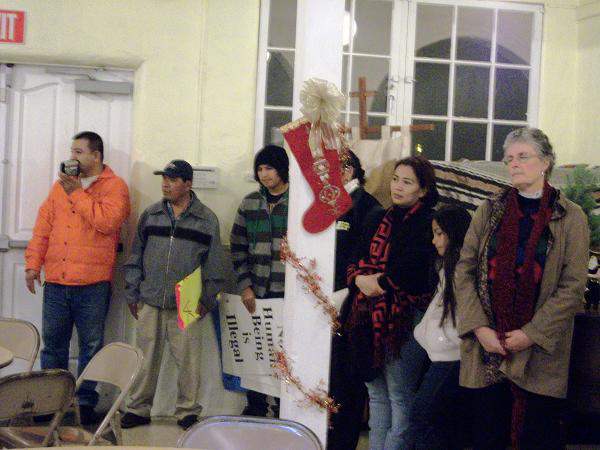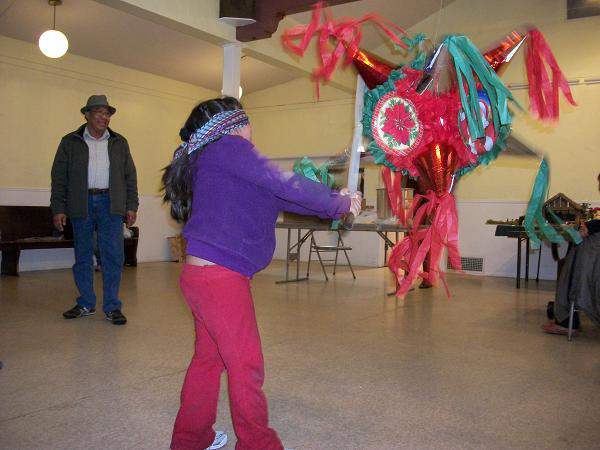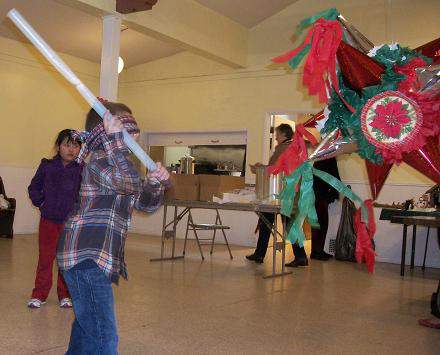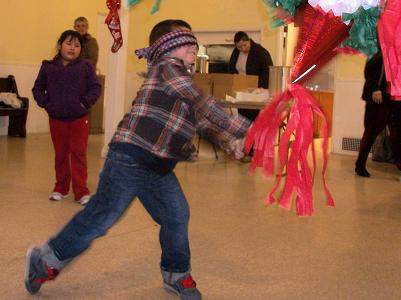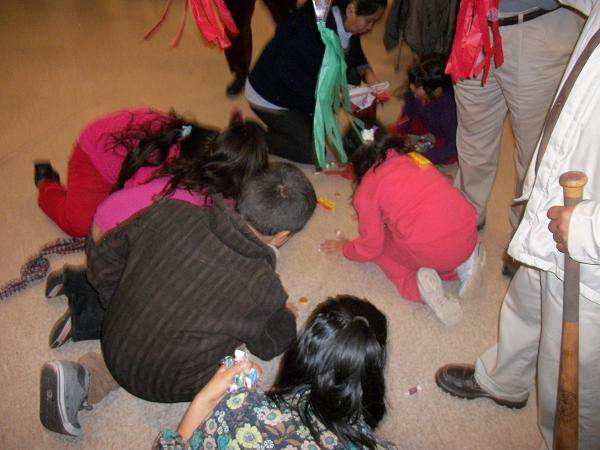by Rockero
Monday, Dec. 13, 2010 at 1:19 AMrockero420@yahoo.com Saturday, December 11, 2010
COLTON, California - In a large public gathering the in cafeteria of Alice Birney Elementary School, well over one hundred community members from Colton, a city with a large low-income immigrant community met with their police chief to expose him to the injustices his officers have been committing and to petition for redress of their grievances.
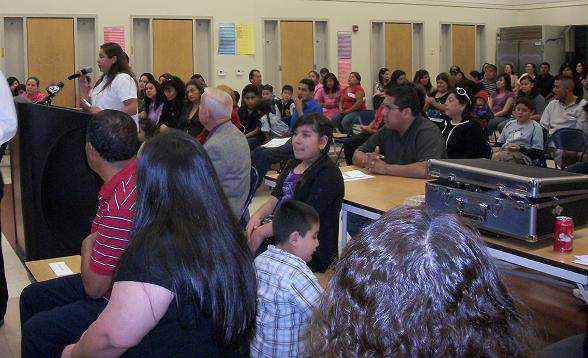
Leer este informe en español: Comunidad Inmigrante de Colton Se Reunió con Jefe de Policía para Reclamar Abusos
The committee Latinos Unidos de Colton, with support from the San Bernardino Community Services Center, the Rapid Response Network, Inland Congregations United for Change, and the Inland Empire Chapter of LULAC, organized the meeting not only to give community members a voice, but to learn from the chief and other experts, such as ACLU immigrant rights attorney Lucero Chávez, what the law is, and also to ask for reforms that would benefit the community and give them a reason to trust the police.
Gabriela Cabrera Figueroa, a thirty-something woman with a gravity of presence and the president of Latinos Unidos, chaired the meeting. She began by welcoming everyone and thanking them for their presence.
"I would like to thank Chief of Police of Colton Bob [Miller], as well as Detective Campa, Dr. Tom Rivera from Cal State San Bernardino, and Mr. Tom Dolan from the organization ICUC for their presence. We would also like to thank [police chaplain] Robert Johnson [and] Maribel Núñez."
She then introduced Verónica Martínez, who explained how the Latinos Unidos Committee came about and what it has been doing. "It arose from need to organize our Colton community, and to raise our voice as a show of rejection of certain injustices that are focused on our community. We've been holding informative meetings for quite some time and our committee has grown because of it and through that growth, changes have strengthened our community. It's thanks to the patience and credibility of our members and comrades in the community that we can say that we're here today."
She also outlined the committee's non-discrimination policy: "Our committee doesn't discriminate against anyone. Rather, it looks to strengthen the ties of friendship and solidarity across the Colton community.
José Luis Ojeda followed, and shared with those present the purpose of the day's gathering. "The main reason for this meeting is to inform the chief of the injustices that are occurring and to try to come to agreements that allow the tranquility of Colton to return so we no longer feel persecuted and harassed by the police. Basically, we want this practice end. Additionally, I'd like to say that we're hardworking people, not criminals. Moreover, I believe it is of utmost importance to emphasize that only working fairly--community, police--can this series of abuses that currently are being committed end, as long as we stick to mutual respect to find solutions to the problems afflicting us."
José Luis Salcedo, a white-haired elder with a soft voice and a communications earpiece in one ear, then summarized the problems the community has been facing: "The immigrants who live here in the City of Colton feel harassed by unfair policies relating to the impounding of our automobiles for not having a license."
He continued, "The many testimonies we have collected demonstrate how the police has focused predominantly in areas where the majority of the poor people with few resources live, such as the area where we reside. Often, we've had people who have had their car taken away when it was parked at their house, which is private property. We know many people have been stranded on the street in the middle of the night, people have had to walk many miles to get home. Many residents have had their cars confiscated as many as five times in a one-year period, while residents in other, affluent areas, neighborhoods south of the 10 freeway, aren't dealing with the same thing. The tow and vehicle impound fees are excessively high. It carries severe economic consequences for our families. The cost to a family exceeds $3,000 for a month. Our families earn much less than that. People have gone through losing their houses, losing their apartments, missed school for the children. Frequently, when picking up our property from the city towyard, Our personal property has been stolen from our cars. Even once our cars have been auctioned off, the vehicle is turned over without the registration, which costs us time and money. The City of Colton, which receives up to $30,000 per year for the storage of impounded vehicles and around $80,000 for the sale of impounded vehicles." He concluded, "Chief, we wish to remind you that the majority of our people respect the law and must drive without a license because they have no other alternative. Impounding cars only contributes to greater insecurity in our communities. It creates mistrust of the department among our families, increasing insecurity and criminality. Thank you."
Community member Salvador Rivera then guided numerous community members through testimonies of injustice committed by the Colton Police Department. Many residents told of being stopped for no reason, and of not being told why they were being stopped. Many of those sharing this experience suspected that they were being racially profiled. Another situation that was reported by several victims was having their car towed from in front of their houses or while it was in their driveway long after they had parked it.
One man, Rodolfo, asked a simple question. "The motorcycle officer who stopped me had a bandanna tied around his head without a helmet. When he stopped me, he said I was going too slow. I wanted to tell him, 'You are also committing an infraction, or correct me if I'm wrong, but you're also committing an infraction by having a bandanna on but no helmet.' I was asking you to answer whether or not this is true, is he committing an violation also?"
The chief did not answer the question.
José Soya spoke in detail about the the excessive fees he has had to pay, as well as a violent incident that occurred as a result of his no being able to drive.
"I'm just here to say that they've taken some eleven cars from me, and for each car they take, it's $1,500, plus $1,500 for the ticket, and then you have to get a new car to be able to get around, and that's another $1,500. It means that in total, you have to pay $4,500 at a time when they take them. They've taken eleven-some cars from me now, and I don't want to drive any more. Two weeks ago, I went from here in Colton to San Bernardino, and I went on my bicycle. Some African-Americans, six African-Americans, grabbed me and beat me. Valerie has pictures of how I ended up. It's just that, for fear of driving, we go out walking or cycling and are more vulnerable to assault or battery. That's all."
The City of Colton charges a $200 administrative fee, a per diem storage fee ranging from $35 to $50, as well as the towing fee, which varies. At this rate, a mandatory 30-day impound generates a minimum cost of $1250.
1A woman reported being racially profiled: "They discriminate against us because of our looks, because we look Mexican. Because I've been living here in Colton for twenty years and I have never seen what I'm seeing! The motorcycle stopped me three times in three weeks." She said that the officer said he had stopped her for something hanging from the mirror, and once he saw her license, left. The same thing happened the second time she was stopped, except that rather than offering a pretext, he simply asked her for her license and left once she provided it. She also spoke of witnessing a police officer in the parking lot of Cardenas Market who stopped a man on his way to his car with his shopping cart and asked him for license before he even got there. When he was unable to provide it, the car was impounded. "So what I'm asking for is justice, that you please respect people,because I've seen a lot of injustice--moms who have been taken out with their groceries, with their children, when they were just taking their food home."
Mr. Rodriguez then shared his testimony: "This is something very sad that happened to a man. He was at my house; he worked with me that day. Since i couldn't take him home that day, that man went on foot. It was a five-minute walk, but he had to cross the park. He was killed that day. The next morning he was dead. He was 150 feet, 200 maximum from where he lived. And there, just across the street, he was murdered."
After about 10 testimonies, the chief was asked to explain the department's policies on checkpoints and car impoundment. The chief introduced himself in Spanish, but continued the rest of his lecture in English. "There is a concern that I hear about trusting the police. [...] The only way we can build trust is start a process like this one."
He then went on to address the issue of improperly-issued citations. "As far as the citations many have received, once the citation is written, that's why we have a court system. To go in front of a judge and present your case. And to present your case, the judge, in court will decide whether the citation was issued properly or not."
He then addressed the excessive impound fees: "Now, a lot of what I've heard today involves towing fees. They're very expensive, I agree. The reason this law was enacted across the state of California, is because the legislature, the elected, was trying to discourage citizens from driving without a license. It became a problem in California that unlicensed drivers were becoming involved in automobile accidents, did not have insurance, and it became a problem. But I've always noticed that it's easy to make a law, but the impact on the community comes later, which is what we're experiencing here today."
The first legislated attacks on automobility in California came in 1992, when collecting the Social Security number of driver's license applicants was authorized, ostensibly to help track down the "deadbeat dads" then being demonized in the media but effectively cutting off unauthorized immigrants from access to a legal way to drive. In 1994, SB 976, which banned licenses for the undocumented in more explicit terms, went into effect along with a raft of "tough on crime" legislation including laws authorizing thirty-day impoundment of cars driven by unlicensed drivers and the Three Strikes Law.
2The same year, California voters approved the racist Proposition 187, which, had it not been found unconstitutional, would have denied health care and educated to the undocumented. It is also the same year NAFTA went into effect and began driving millions of Mexicans from their ancestral lands.
The chief subsequently addressed the professionalism of his officers. "It's my responsibility to make sure our officers and courteous and that they help you with any problem that you have. If this is not happening, we have a system in place that you can file a citizen's complaint, and that's fully investigated. That is California law also. I've told the committee that I work with that I work with human beings. And on occasion, I become aware of issues officers have done in the community that the community doesn't like, and my job is to correct that. I was very touched at the council meeting when 150 people showed up with families in the audience that we had to do something. That's why I called Dr. Rivera at Cal State San Bernardino. I had worked with him before when I worked at Cal State, and I wanted to have some kind of a committee to get a group of people together to dry to address all these concerns."
He then spoke on the city's towing policy. "The vehicle code of the state of California states if you're unlicensed, you cannot drive a car." "I think it's important for us to try and find a way in our community to simply help people drive legally, so then these kind of problems don't come up."
He then commented on the community members who shared experiences of racial profiling. "As far as the things I have heard about racial profiling, officially and from my office, we do not racially profile. That--them two words are used a lot in policing, that you'll hear sometimes in the community, that the police are looking at a certain race. We don not--that is not acceptable, everybody should be treated equally and fairly. And if it comes to my attention, we will deal with that."
He then lauded the police and explained his attitude toward coming to the afternoon meeting. "I knew when I came to this meeting, some of the citizens were not going to be happy with us. But I promised myself not to be defensive and to listen to everyone."
Next, a young woman asked the chief if he was willing to make specific changes.
When asked to allow people to make a call from an officer's phone when losing a car, the chief said that he would look into the technology.
When asked for a 30-minute grace period to find another driver to take a vehicle that might otherwise be impounded for 30 days to a safe place, the chief said that he would look into it.
When asked to not leave people stranded in unsafe areas, he agreed.
When asked to end racial profiling and to limit stops to those made with probable cause, he looked incredulous. "That's a tough question you just asked me. That question's been debated for the last 25 years in law enforcement. But again, our community, which I care about a lot, I answer it this way. We don't racial profile. We target activity."
When asked if he would continue to review the policies with community input, he agreed, but on one condition. "I will continue to meet with any group, I only have one requirement, and that's that we bring some good food next time."
The community then submitted a copy of the City of Oakland's towing policy, which is currently looked to as a best practice within the immigrant rights community.
The floor was then opened up for questions from the community either for the chief or for the legal experts.
A woman asked if the police can impound a car that is not being driven. He said that he would have to look into the particular case.
Another woman asked about ways to measure racial profiling, whether through department statistics or having officers identify themselves to their targets, and how to pursue justice when racially profiled. The chief answered that "Yes, there is a complaint procedure, and after the meeting, we can show you." He reiterated his claim that officers only make stops based on probable cause. "Specifically, usually that is when an officer comes to the front of the car, they'll identify themselves, and they'll tell you the reason for the stop. That's the way we train our police officers. If that's not happening, then you let us know, and we'll have a supervisor investigate that."
The chair then gave the ACLU attorney Chávez the opportunity to answer the same questions. She explained that the law required officers to have probable cause to make a traffic stop, and added that if a car is being impounded under the section of the law that authorizes the impounding of a vehicle driven by an unlicensed driver, it is much less likely that the officer has probable cause to order the tow if the vehicle is not in motion.
José Luis Salcedo returned to the microphone to ask a question. "I could ask it in English, but I'm going to ask in Spanish so the community finds out about their rights. Have the officers that work for you had training regarding the American Constitution?" When the chief affirmed, Salcedo continued. "I see a civil rights violation on the part of your officers, first because they're profiling, and second because they're violating the Fourth Amendment to the Constitution, picking up automobiles when you shouldn't do it because you can't do it. Only if a vehicle is a crime scene or if the car has been used in a crime can it be seized. So they have violated this and committed a very grave violation because it's robbing the community. That is all."
A former public defender and LULAC member, speaking in English, pointed out that
section 14602.6 of the vehicle code allows an officer discretion as to whether or not to impound a vehicle, and questioned whether the city's operation of an impound yard for police-possessed vehicles created a conflict of interest. "Now the problem with that is, the community will see this as becoming more unfair, because there's other considerations for the car being impounded. And the law as it is, in my opinion is already very discriminatory, in that it disproportionately impacts the poor, who for whatever reason they have, cannot get a license or have difficulty keeping a license, and they take the vehicle. Doesn't impact the others. And that's my main concern, because from the information I've obtained from the county budget, from the audit, and from other places, it's my understanding that for fiscal year 2010, there was 657,000 of revenue being generated by the tower fees. Of that, 442,689 was cost of running the operation. That would make a surplus of 234,011, and that's a big amount of money. So, my question for the panel is, do you feel that is unfair that it appears to be a conflict of interest?"
"There's nothing to answer," said the chief. When persuaded that there was a viable question about the appearance of a conflict of interest due to the department's operation of the towyard, he relented. "Who was the gentleman who got up? Can you identify yourself?" Once the man gave his name, the chief continued to interrogate. "And you're with...?" Once the man gave his credentials, the chief, whose ears had perked up as soon as he heard English spoken, even though the entire meeting had been translated for him, said that he would love to have coffee with the man.
At that point, a suggestion came from the floor. "He should have coffee with all of us!"
He responded, "It's interesting the way you talked about the towyard, very interesting the way you frame that. Theoretically, you're right, it does create money. It's supposed to be just cost recovery to run the program. The excess is taken back to the general fund and used across the city, so you are right. The towyard operation itself, quite frankly--and I need to be honest with you. It's a headache. It's a headache for me because we use it--it was developed in order to reduce costs for people for getting the cars out cheaper than you could at a tow place. But what happens over time is, most of the complaints I receive are out of the towyard operation. So, you know, it's something we're looking at very seriously right now. There is no incentive for the officers to go out and tow cars for revenue. That would be illegal. We can't do that and you know that. We just ask people to target activity, but the towyard is something that I'm gonna have to address with the city management and our elected leaders at some point what we're gonna do with that because I know that's an emergent issue."
The facilitator asked Chávez to weigh in on that question as well. She explained that there are successful, state-approved models that cities use to ensure that police are not incentivized to impound cars, and that something similar may be practical in Colton.
The next question came from a man who asked if the department kept statistics on detentions and if the chief would be willing to go over those statistics with the community to find out if there had been more this year, pointing out that it seemed to him that the police were much more active.
The chief did not answer the question.
The next man did not ask a question, but explained that the struggle would continue until there was justice for the workers.
The last woman asked, "What can we do when we see a police officer about to run over a child because they're on the phone? I've seen a lot of injustices here, and we want to know what we can do. I've seen it several times. I see every cop on the phone." She asked for a show of hands of how many people had seen police officers driving while on the phone, and nearly every hand in the room went up, including the chief's.
The chief explained that on-duty officers are exempt from the hands-free law. He did, however, express concern from the risk management perspective. "We're finding out now that more officers are killed in driving accidents than any other line of work, whether they get into any other encounter, it's driving."
Then the facilitator asked the chief for a date for a follow-up meeting, and urged the audience to sign up to join Latinos Unidos. She again thanked the officials and the individuals who helped make the meeting happen.
---------------------
1. Colton Police Department. "Stored/Impounded Vehicles." n.d. http://www.coltonpd.org/images/storeimpoundedvehicles.pdf. Accessed December 13, 2010.
2. Márquez, José. "The Conflict: Immigrant Drivers’ Licenses" July 2002. http://www.californiaconnected.org/tv/archives/50#yv02backstory
http://la.indymedia.org/news/2010/12/243411.php
Sábado, 11 de diciembre 2010
COLTON, California - En un encuentro público en el comedor de la escuela primaria Alice Birney Elementary School, más de 100 residentes se reunieron con su jefe de policía para hacerle saber las injusticias cometidas por sus oficiales y para reclamarle cambios de protocolo.
Read this article in English: Colton Immigrant Community Meets PD Chief, Demands JusticeEl Comité Latinos Unidos de Colton, con el apoyo del Centro de Servicios Comunitarios de San Bernardino, la Red de Respuesta Rápida, y Congregaciones Unidas para el Cambio, convocó la reunión no sólo para darle a la comunidad la oportunidad de alzar la voz, sino también para aprender del jefe y de otros expertos, como la abogada de derechos de inmigrantes de la Unión Americana de Libertades Civiles (ACLU) Lucero Chávez lo que es la ley y para pedir reformas en beneficio a la comunidad y restaurar confianza con la policía.
Gabriela Cabrera Figueroa, mujer de presencia imponente y presidenta de Latinos Unidos, facilitó la asamblea. Comenzó por darles la bienvenida a todos y agradecerles su presencia.
"Quisiera agradecer la presencia del jefe de policía, Bob [Miller], de Colton, así como del detective Campa, el Dr. Tomás Rivera de la Universidad Estatal de San Bernardino, y del Sr. Tom Dolan, de la organización ICUC. También quisieramos agradecer la presencia de ... [capellán] Robert Johnson [y] Maribel Núñez."
A continuación, la Sra. Verónica Mártinez describió la génesis del Comité Latinos Unidos. "Surge con la inquietud de organizar nuestra comunidad de Colton, y alzar la voz como muestra de repudio hacia ciertas injusticias que están concentrando en nuestro comité. Tiene ya cierto tiempo realizando reuniones informativas para incrementar nuestro comité a través del mismo, cambios que fortalezcan a nuestra comunidad. Gracias a la paciencia y credibilidad de nuestros miembros y compañeros en la comunidad es que podemos decir que estamos presentes el día de hoy."
También desglosó la práctica anti-discriminatoria del Comité. "Nuestro comité no discrimina a nadie, sino al contrario, busca fortalecer los lazos de amistad y compañerismo en la misma comunidad de Colton."
Siguió José Luis Ojeda con el propósito del encuentro. "La razón principal de esta reunión es de dar a conocer al jefe de policía las injusticias que se están llevando a cabo y de tratar de buscar encontrar acuerdos que permitan que la tranquilidad de Colton regrese y así no sentirnos perseguidos ni acosados por la policía. En conclusión, que esta práctica termine. Aparte quiero indicar que somos personas trabajadoras, no delincuentes. Además, considero de suma importancia enfatizar que sólo trabajando justamente--comunidad, policía--se podrá terminar esta serie de atropellos que actualmente se cometen, siempre apegados al respecto común por buscar soluciones a los problemas que nos aquejan."
El anciano de voz baja con auricular puesto, el Sr. José Luis Salcedo, luego dio un resumen de los problemas enfrentadas por la comunidad. "Los inmigrantes que viven aquí en la ciudad de Colton nos sentimos acosados por políticas injustas relacionadas con el decomiso de nuestros automóbiles por no tener licencia. A veces nos sentimos que se quiere financiar la crisis financiera de la ciudad quitándonos nuestros vehículos y multándonos por no tener la licencia."
Continuó, "Los muchos testimonios que hemos recaucado demuestran como la policía se ha enfocado predominantemente en áreas donde vive la mayoría de personas pobres de escasos recursos como el área donde nosotros residimos. Con frecuencia, hemos tenido personas a quienes se les han quitado su carro porque supuestamente hacen ruido. Sabemos que a muchas personas se les ha quitado su carro cuando estaba estacionado en su casa, la cual es propiedad privada. Sabemos que muchas personas se han quedado tiradas en la calle con sus hijos a la media noche, personas que han tenido que caminar muchas millas para poder regresar a su hogar. A muchos residentes, se les han confiscado sus carros hasta cinco veces en el periodo de un año, mientras que residentes en otras áreas afluentes, vecindades al sur de la autopista 10, no tienen ninguna experiencia similar. Los honorarios del remolque e incautación de vehículos es excesivamente alta. Lleva consecuencias económicas graves para nuestras familias. El costo de una familia ecxede de los $3.000 por un mes. Nuestras familias ganan mucho menos que eso. Pérdidas de hogares se ha vivido, pérdidas de departamentos, pérdida de clases para los niños, con mucha frecuencia al recoger de nuestros carros del corralón de la ciudad, nuestras propiedades personales han sido robadas de nuestros vehículos. Aun a pesar de nuestros vehículos han sido subastados, se nos entrega el vehículo sin la registración, la cual nos hace perder más tiempo y dinero. La ciudad de Colton, que recibe hasta $30.000 por año del almacenamiento del vehículo encautado y alrededor de $80.000 por venta de vehículos decomisados." Concluyó, "Señor Jefe de Policía, le queremos recordar que la mayoría de nuestra gente es respetuosa de la ley y que tiene que manejar sin licencia porque no tiene otra alternativa. El decomiso de autos sólo contribuye a mayor inseguridad de nuestras comunidades. Se crea desconfianza de su departamento en nuestras familias, incrementado la inseguridad y la criminalidad. Gracias."
Luego el señor Salvador Rivera facilitó una serie de testimonios de parte de miembros de la comunidad sobre las injusticias cometidas por el departamento de policía de Colton. Muchos reportaron que se les habían detenido sin razón y que nunca se les informó el motivo de la parada. Muchos que coincidieron en esta experiencia sospecharon que fueron perfilados racialmente. Otra situación reportado por varios fue la encautación de vehículos de delante de la casa o de la entrada a la casa buen rato después de que fueron estacionados.
Un hombre de nombre de Rodolfo hizo una pregunta simple. "El policía de la moto que me paró tenía un paño amarrado de la cabeza, sin casco. Cuando me paró, me dijo que iba muy despacio. Yo le iba a decir que 'Usted también está cometiendo una infracción, o contésteme usted si no es cierto, que usted está cometiendo una infracción de traer un paño amarrado a la cabeza, pero sin casco.' Le decía que me conteste si o no es cierto, que ¿él está cometiendo una infracción también?"
No contestó el jefe.
Entró en detalle el Señor José Soya sobre las multas excesivas que tuvo que pagar, y en seguida relató la historia de un incidente violento que vivió por consecuencia de no poder manejar.
"Yo estoy nada más para decirles que a mí me quitaron como once carros y cada carro que me quitan son $1.500 más 1.500 dólares de
ticket, y uno tiene que comprar otro carro otra vez para moverse, son otros $1.500. Quiere decir que al cabo, uno tiene que pagar una cuota de $4.500 que le quitan a uno en el momento. Me han quitado como once carros ya, yo ya no quería manejar más. Hace 15 días, me fui de aquí de Colton a San Bernardino y me fui en bicicleta. Unos morenos--seis morenos--me agarraron, me pusieron una golpiza. La señora Valerie tiene fotos de como me dejaron. No más que, por miedo uno a no manejar, sale uno en bicicleta o caminando, y se pone uno a que lo asalten, o lo golpeen. Era todo."
La Ciudad de Colton cobra una cuota administrativa de $200 más una cuota diaria de entre $35 y $50 de almacenamiento, más el cargo del remolque, el cual que varía. A ese costo, un decomiso de 30 días obligatorios tiene un saldo mínimo de $1250.
1Una mujer dio testimonio que fue perfilada racialmente. "Nos discriminan no más por como nos ven, porque nos ven mexicanos. Porque yo tengo veinte años viviendo aquí en Colton y ¡nunca había visto ésto que estoy mirando! A mí me paró tres veces la policía, él del moto, en tres semanas." Dijo que la primera vez, el oficial dio la excusa que el carro traía algo colgando, pero cuando vio que la mujer llevaba licensia, la dejó en paz. La segunda vez, el oficial ni siquiera dio ninguna excusa sino simplemente le pidió la licensia y al verla, se fue enojado. También comentó que había visto a un oficial encautar el carro de un señor en el estacionamiento del mercado Cárdenas cuando éste iba en camino al auto con su carrito de abarrotes. El oficial le pidió la licencia antes de que el señor hubiese llegado al carro y cuando el señor no pudo mostrarla, perdió el carro. "Entonces yo, lo que pido es justicia, que por favor respeten a la gente, porque yo he mirado mucha injusticia--mamás que las bajaron con su comida, con sus niños que vinieron de otros lados a llevar su comida, y la gente ya se iba."
Luego habló el Sr. Rodríguez. "Ésta es una cosa muy triste a un señor que pasó. Estaba en mi casa; trabajó conmigo ese día. Por yo no poder llevarlo a su casa, ese señor se fue caminando. Era una caminada de cinco minutos, pero tenía que atravesar el parque. Ese día lo mataron. Amaneció muerto. Estaba a 150, 200 pies máximo, allí vivía él. Y en la mera parte de en frente, allí lo asesinaron."
Después de una docena de testimonios, al jefe le pidieron que explicara la política actual que tiene el departamento sobre retenes de tráfico y el decomiso de carros. El jefe se presentó en español, pero terminó su discurso en inglés. "La inquietud que estoy oyendo tiene que ver con confiar a la policía. [...] La única manera de entrar en confianza es a través de comenzar un proceso como éste."
Trató el tema de la asignatura de citaciónes realizada de manera inapropriada. "En cuanto a las citaciones que muchos han recibido, una vez que se asigna una citación es por eso que existe un sistema jurídico, para que uno presente su causa ante un juez. Y en la corte, el juez decide si o no la citación fue asignada de manera apropriada."
Luego habló de las multas excesivas relacionado con el decomiso de carros. "Mucho de lo que he oído aquí tiene que ver con las cuotas de las grúas. Son cara, lo reconozco. The razón por la cual está ley entró en vigor a lo largo del estado de California es porque nuestra legislatura elegida estaba tratando de desanimar a los ciudadanos de manejar sin licencia. Se volvió problema que muchos conductores sin licencia se estaban accidentando, no tenían aseguranza, y llegó a ser problema. Pero he notado que es fácil aprobar una ley, pero el impacto sobre la comunidad no llega hasta después, que es lo que estamos viviendo hoy."
Los primeros ataques contra el derecho a la mobilidad en el estado de California se realizaron en 1992, cuando la legislatura autorizó la colecta del número de seguro social (SSN) del solicitante de una licencia de conducir, dizque para localizar a padres que habían abandonado a sus hijos, grupo que había recibido atención mediática en ese año, pero que, efectivamente eliminó la única fuente legítima para la comunidad indocumentada de conducir legalmente. Dos años después, se ilegalizó de forma más explícita la posibilidad de que la comunidad obtuviera licencia, en conjunto con varias otras leyes de mano dura, tal como la ley que autoriza el decomiso de un carro por treinta días si su conductor no tenía licencia y la ley "Three Strikes."
2Ese mismo año, electores en California aprobaron la racista Proposición 187, la cual que, si no hubiera sido descartada por inconstitucional, habría negado servicios de salud y educación al pueblo indocumentado. Fue también en 1994 que el acuerdo neoliberal de "libre comercio" NAFTA entró en vigor y con él, la fuga de millones de mejicanos de su tierra natal.
A continuación, el jefe habló del profesionalismo de sus oficiales. "Es mi responsabilidad asegurar que nuestros oficiales sean respetuosos y que les ayuden con cualquier problema que tengan. Si ésto no pasa, tenemos un sistema para poner una denuncia que se investiga plenamente. Esto también es la ley de California. Le he dicho al comité con él que colaboro que yo trabajo con seres humanos. Y que ha habido ocasiones en que yo me he enterado de asuntos que han hecho mis oficiales que no han quedad bien con la comunidad, yo me encargo de corregirlos. Fui muy conmovido en la reunión del consejo municipal cuando se presentaron 150 personas, inclusive con sus familias, que teníamos que hacer algo. Por eso le hablé al Dr. Rivera de la Universidad Estatal de California, San Bernardino. He colaborado con él anteriormente, cuando trabajaba en Cal State, y quería formar un comité para reunir unas personas para intentar solucionar estos problemas."
Referente a la política sobre el decomiso de carros, dijo que "El código vehicular del Estado de California declara que si uno no tiene licencia, no puede conducir." También declaró que "Considero que es importante que busquemos una manera de ayudar a las personas a conducir legalmente para que este tipo de problema no se presente."
Luego comentó sobre las personas que compartieron sus experiencias con perfil racial. "En cuanto a lo que he oído acerca del perfil racial, oficialmente, y de parte de mi oficina, no utilizamos perfil racial. Son dos palabras que se usan mucho en el trabajo policial, que a veces se escucha en la comunidad que la policía sólo busca a los de una cierta raza. Eso es inaceptable. Todos deben ser tratados equitativamente y justamente. Y si yo me entero, lidiamos con eso."
Terminó con elogiar a sus oficiales, y con explicar su actitud son respeto a la reunión. "Ya sabía cuando venía a esta junta que algunos de los ciudadanos no iban a estar contentos con nosotros. Pero decidí no ser defensivo y escuchar a todos."
Próximamente, una señorita se acercó al micrófono y pidió reformas específicas.
Cuando ésta le pidió al jefe que permitiera usar el celular del oficial al perder un carro, dijo el jefe que iba a investigar la tecnología.
Cuando le pidió un "periodo de gracia" de 30 minutos para encontrar otro conductor para un carro que normalmente sería decomisado, el jefe dijo que iba a investigar esa posibilidad.
Cuando le pidió que ya no dejara a personas abandonadas en áreas inseguras, se puso de acuerdo.
Cuando le pidió que terminara la práctica de perfil racial y que limitara detenciones a las que se basaban en una causa probable, hizo cara de incrédulo. "Es una pregunta difícil que me acabas de hacer. Esa pregunta se ha discutido por los últimos 25 años entre agencias de orden público. Pero repito, nuestra comunidad, que me importa mucho, les contesto de esta manera. No hacemos perfil racial. Nos enfocamos en la actividad [ilegal]."
Cuando la joven le preguntó si se disponía a revisar las políticas con la participación de la comunidad, se puso de acuerdo pero también puso un requisito. "Continuaré reuniéndome con cualquier grupo, pero bajo la condición que traigamos una buena comida para la próxima."
De allí la comunidad le otorgó una copia de la política de la ciudad de Oakland como un ejemplo de una práctica más justa.
A partir de entonces, se dio a la comunidad la oportunidad de hacer preguntas directamente o al jefe de policía o a la experta legal de la ACLU.
Una mujer preguntó si la policía podía incautar un carro que no está siendo manejado. El jefe contestó que tendría que investigar el caso particular.
Otra mujer preguntó sobre medidas al perfil racial, como estadísticas del departamento, o por requerir que los oficiales se identifican cuando paran a alguien, y sobre maneras de procurar justicia cuando uno es perfilado racialmente. El jefe contestó que, "Sí, existe un proceso para quejas, y después de la reunión, se lo explicaré. Repitió que sus oficiales sólo detienen a personas cuando tienen causa probable. "Específicamente, generalmente [el protocolo] es que cuando un oficial se acerca a la puerta del carro, se identifican, y explican la razón por la parada. Así es como entrenamos a nuestros oficiales. Si no es lo que ocurre, entonces avísennos, y un supervisor lo investigará."
La facilitadora luego le dio la oportunidad a la licenciada Chávez de contestar las mismas preguntas. Ella explicó que la ley requiere que un oficial tenga causa probable para hacer una parada de tráfico, y agregó que si un carro se decomisa bajo la sección del código vehicular que autoriza la incautación de un carros conducido por un conductor sin licensia, la probabilidad que exista causa probable is mucho menor si el carro está estacionado.
José Luis Salcedo regresó al micrófono para hacer una pregunta. "La podría hacer en inglés, pero la voy a hacer en español quiero que la comunidad se entere de sus derechos. ¿Los policías que trabajan para usted han tenido alguna educación al respecto de lo que es la constitución americana?" Cuando asintió el jefe, Salcedo continuó. "Yo veo una violación a derechos civiles por parte de sus oficiales, primero porque tienen un perfil, y segundo porque están violando la cuarta enmienda de la constitución, recogiendo automóbiles cuando no lo deben hacer porque no lo pueden hacer. Y porque solamente que el vehículo esté la escena de un crimen o el carro haya sido usado por un crimen, sólamente así pueden. Entonces ellos han violado y han hecho una violación bien grave porque ese es un robo a la comunidad. Eso es lo único."
Un ex-defensor público y miembro de LULAC, hablando en inglés, recalcó que la sección 14602.6 del código vehicular permite que un oficial utilice su discreción cuando decide decomisar un carro o no, y cuestionó si el hecho de que la ciudad gestiona su propio corralón estuviera creando un conflicto de interés. "Ahora, el problema con ésto es que, la comunidad verá esto como algo que degenera en algo más injusto, porque hay otras consideraciones para el decomiso del carro. Y la ley, así como está, en mi opinión ya es muy discriminatoria, en virtud de que impacta disproporcionadamente a los pobres, quienes, por equis razón, no pueden obtener licencia o tienen dificultad en conservar su licencia, y se les quita el vehículo. No impacta a los demás. Y ésta es mi preocupación principal, porque según la información que he obtenido del presupuesto del condado, de la auditoría, y de otros lugares; tengo entendido que para el año fiscal 2010, se calcularon divisas de [$]657.000 de las multas de remolques. De estos fondos, sólo [$]442.689 fueron de recuperación de los gastos del operativo. Sería entonces un superávit de [$]234,011, que es una gran cantidad de dinero. Entonces, mi pregunta para el panel es, ¿se sienten que me equivoco que ésto aparenta un conflicto de interés?"
"No hay nada que contestar," dijo el jefe. Cuando se le persuadió que había una pregunta válida sobre la apariencia de un conflicto de interés, cedió. "¿Quién fue el señor que se paró? ¿Te puedes identificar?" Una vez que el hombre dio su nombre, el jefe siguió interrogándolo. "¿Y vienes con...?" Una vez que el hombre dio su credencial, el jefe, que empezó a poner más atención cuando escuchó el idioma inglés a pesar de que se le proporcionó interpretación simultánea durante la reunión entera, dijo que le encantaría tomarse un café con el señor.
En ese momento, una voz del público reclamó, "¡Que se tome su café con todos nosotros!"
En fin, el jefe contestó, "Es interesante la forma en que hablaste del corralón, muy interesante el marco dentro del cual lo discutes. Supuestamente sólo se puede recuperar los costs para manejar el programa. El exceso se destina al fondo general y se usa a lo largo de la ciudad, entonces tienes razón. El operativo del corralón, en sí--y francamente, tengo que hablarles honestamente--es un dolor de cabeza. Es un inconviente para mí porque lo usamos--fue desarrollado para reducir costos para que las personas retiren sus carros a menor costo que con las compañías de grúas. Pero lo que pasa con el tiempo es que la mayoría de quejas que me llegan provienen del operativo del corralón. Entonces, es algo que estamos examinando muy seriamente en este momento. No hay ningún incentivo para que los oficiales salgan a decomisar carros para las divisas. Eso sería ilegal. No podemos hacer eso y bien lo sabes. Sólo pedimos que se enfoquen en la actividad, pero el corralón es algo que voy a tener que hablar con los líderes de la ciudad y nuestros representantes elegidos en algún momento porque es un asunto emergente."
El facilitador le pidió a la licenciada Chávez que contestara la pregunta del señor. Explicó que existen modelos exitosos que son aprobados por el estado para corralones municipales ya en uso por varias ciudades que aseguran que no se les incentiviza a la policía el decomisar los carros, y que a lo mejor son prácticas que se podrían implementar en Colton.
La siguiente pregunta vino de un himbre que preguntó si el departamento de policía tenía estadísticas sobre detenciones y si el jefe estaría dispuesto a revisar esas estadísticas con la comunidad para averiguar si se ha incrementado el número de detenciones en este año, notando que este año le parecía que han habido más detenciones.
El jefe no le contestó.
El próximo hombre no hizo ninguna pregunta, pero explicó que la lucha continuaría hasta que hubiera justicia para los trabajadores.
La última señora preguntó, "¿Qué podemos hacer cuando miramos que un policía, por estar en el teléfono, está a punto de atropellar a una niña? Aquí he visto muchas injusticias, y queremos saber lo que podemos hacer. Lo he visto varias veces. Cada policía que yo veo está hablando por teléfono." Pidió que se levantaran la mano todas las personas que habían visto a oficiales que hablaban por teléfono cuando manejaban, y se levantaron casi la mayoría de las manos, inclusive la del jefe.
El jefe contestó que oficiales en horas de trabajo son excluídos de la ley que prohibe hablar y manejar a la vez. No obstante, sí expresó preocupación desde el punto de vista de minimización de riesgos. "Nos estamos enterando que más oficiales se mueren en accidentes de tránsito que en cualquier otra actividad profesional."
La facilitadora luego le pidió al jefe una fecha para una próxima reunión e instó al público que se sumaran a la lucha de Latinos Unidos. Agradeció nuevamente a los oficiales y los individuos que ayudaron a hacer realidad la reunión.
---------------------
1. Colton Police Department. "Stored/Impounded Vehicles." n.d. http://www.coltonpd.org/images/storeimpoundedvehicles.pdf. Accessed December 13, 2010.
2. Márquez, José. "The Conflict: Immigrant Drivers’ Licenses" July 2002. http://www.californiaconnected.org/tv/archives/50#yv02backstory
002 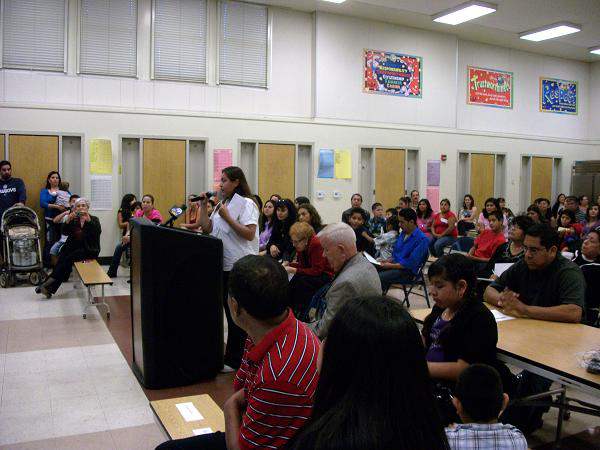
Testimony
003 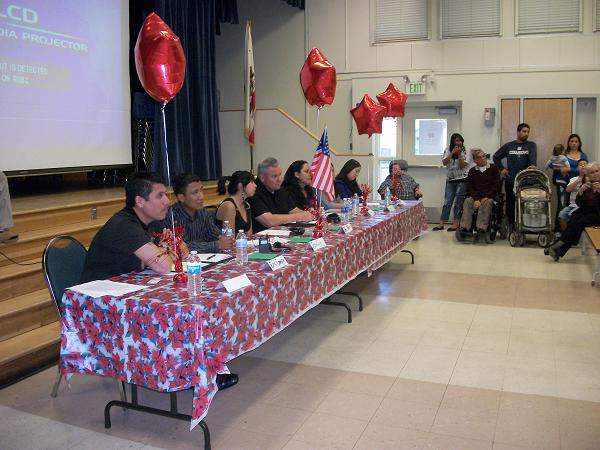
Officials, panelists, and facilitators.
004 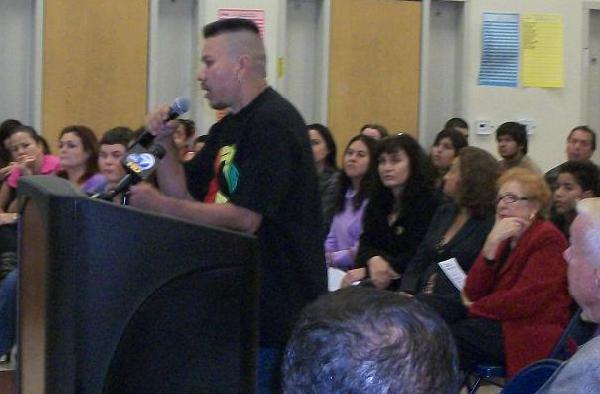
Testimony
005 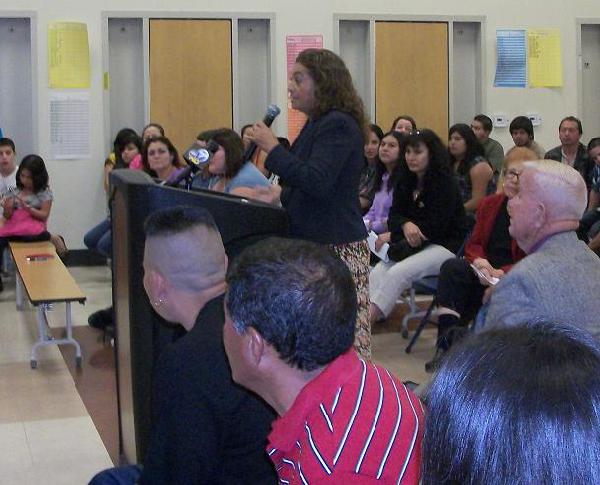
Testimony
006 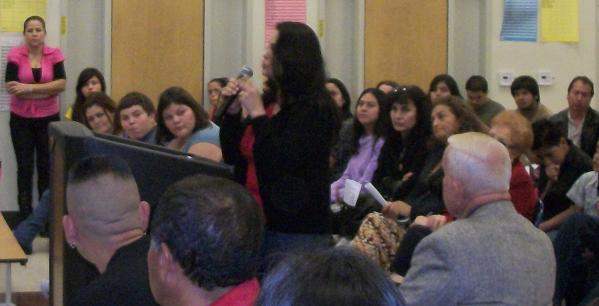
Testimony
